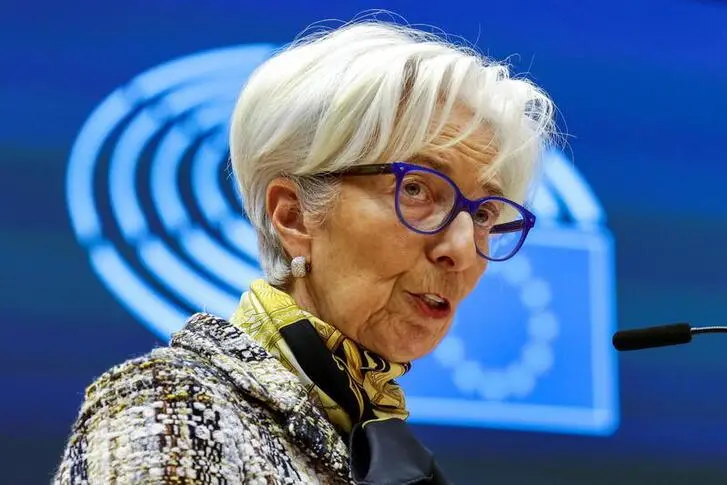PHOTO
(The author is a Reuters Breakingviews columnist. The opinions expressed are her own.)
LONDON - No central bank is an island. Even so, European Central Bank President Christine Lagarde will have to convince financial markets that her institution is at least semi-detached from the Federal Reserve. She has a good case.
Traders have started to expect that the U.S. central bank will deliver four, rather than three, interest rate rises this year to bring inflation down from a four-decade high of 7%. That is having ripple effects beyond America’s borders. Euro zone money-market prices on Wednesday showed traders have pulled forward the timing of when Lagarde will first raise interest rates to September and expect a second hike in December. Meanwhile, the yield on the benchmark 10-year German bond yield rose above zero for the first time since 2019.
The rise in long-term interest rates isn’t ideal but ECB officials will be more concerned by money-market moves that fly in the face of their guidance. As ECB Chief Economist Philip Lane said earlier this month, rate-setters expect euro zone inflation to retreat from December’s record high of 5% and return below its 2% target in 2023 and 2024. They therefore do not anticipate the criteria to hike rates will be fulfilled this year. The bank also expects to keep buying bonds throughout the year.
Granted, central banks around the world misjudged how high inflation would rise and how stubborn it would prove, but reason is on the ECB’s side this time. Central bankers look through inflation spikes caused by temporary factors, like surging energy costs, and only worry if price pressures become broad based or feed through to wage rises. This is less of a concern in the euro zone than in the United States. For example, euro zone negotiated wages rose 1.3% in the third quarter of 2021, compared with 1.8% in the second quarter. While those figures pre-date inflation’s rise to record peaks, the euro zone labour market has more slack than the American one. Also, multi-year wage accords in countries like Germany mean salaries are less apt to chase inflation higher as quickly.
Lagarde will have to launch a public relations blitz to persuade markets to change their minds. So far, investors don’t seem to be listening to her, but at least she has some convincing arguments to make.
CONTEXT NEWS
- Money market prices on Jan. 19 showed traders had pulled forward their bets on a 10 basis point interest rate rise from the European Central Bank to September, and were expecting a second rate increase by December. Those shifts mirrored moves in the United States, where investors now expect the Federal Reserve to raise rates as early as March and another three times by the end of 2022.
- Germany’s 10-year bond yield on Jan. 19 rose above 0% for the first time since 2019.
(The author is a Reuters Breakingviews columnist. The opinions expressed are her own.)
(Editing by Neil Unmack, Oliver Taslic and Karen Kwok) ((For previous columns by the author, Reuters customers can click on PATTANAIK/ SIGN UP FOR BREAKINGVIEWS EMAIL ALERTS https://bit.ly/BVsubscribe | swaha.pattanaik@thomsonreuters.com; Reuters Messaging: swaha.pattanaik.thomsonreuters.com@reuters.net))





















